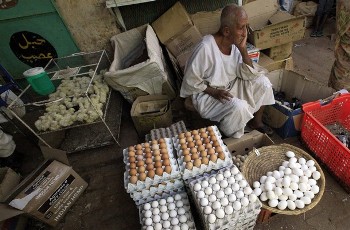Sudanese people realise defending homeland more urgent than food & drink: NCP
June 4, 2013 (KHARTOUM) – Sudan’s ruling National Congress Party (NCP) today argued that Sudanese people would ignore calls by opposition parties to topple the government on the grounds of difficult living conditions.
 The head of the NCP’s organisational communication, Hamid Sideeg, said that Sudanese people are sharing with the government the sense that the country is being targeted and priority should be given to its security and protection.
The head of the NCP’s organisational communication, Hamid Sideeg, said that Sudanese people are sharing with the government the sense that the country is being targeted and priority should be given to its security and protection.
Sideeg however, acknowledged peoples’ right to demand improvement in their living conditions needs but said that priority is now given to securing and protecting the country against foreign intervention.
The NCP official responded to questions regarding the deterioration in basic services such as the severe water problem in Gedaref and Port Sudan states by saying that Sudanese people will not be “weakened” by lack of necessary services despite their vital importance.
On Monday, the political secretary of the opposition Popular Congress Party (PCP), Kamal Omer, declared that opposition forces are united around the goal of toppling the regime led by president Omer Hassan Al-Bashir and said that the opposition is setting up coordination committees among grass-roots to bring about an unprecedented breakthrough.
Omer said that popularity of the NCP has dropped significantly and claimed that its recent political rallies saw a low turnout due to growing poverty.
The opposition official disclosed that efforts are under-way to mobilize grass-roots to set the stage for an uprising noting that street protests are the only way to stop the war and bring about change.
Sudan’s economy has been grappling with soaring inflation and a depreciating currency since the country lost three quarters of its oil production with the secession of South Sudan in July 2011.
Inflation jumped to 46% percent in April, and commodity prices have risen by 300% since 2010 mainly food prices, as the Sudanese pound continues to reach new lows on the black market for hard currency.
Last year, the government launched a package of tough austerity measures, including scaling back fuel subsidies to close a fiscal gap, sparking short-lived protests.
(ST)
